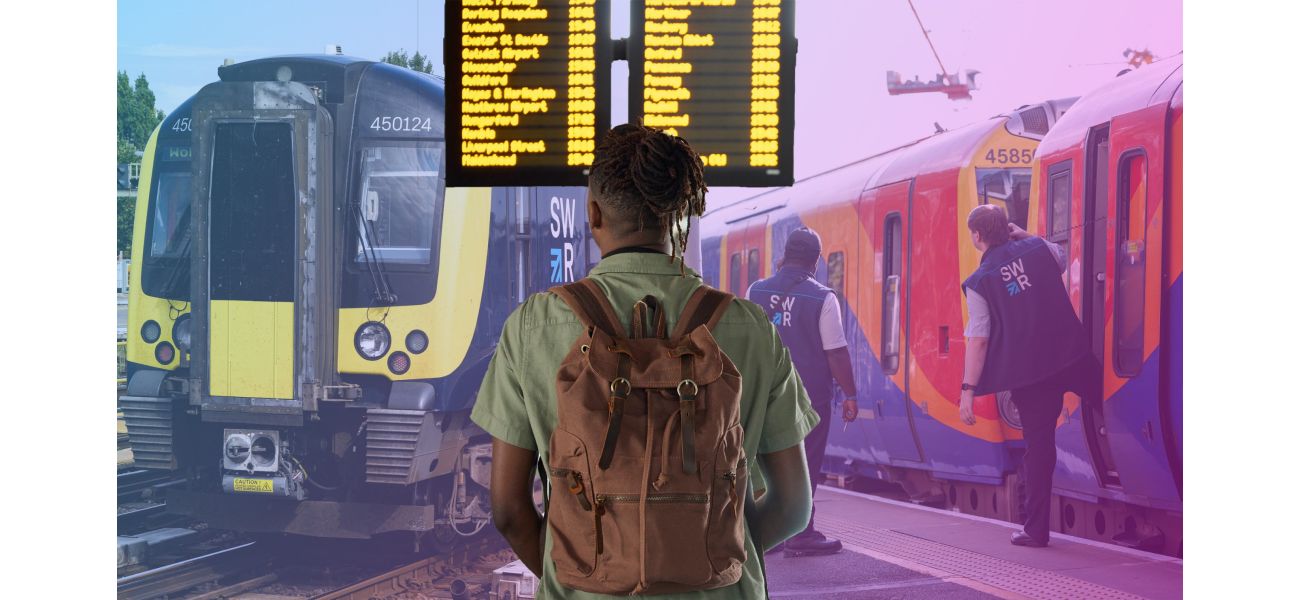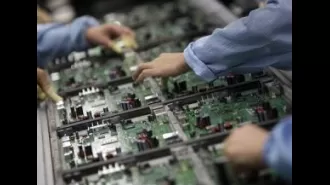C2C, South Western, and Greater Anglia chosen as initial train companies to be brought under government control.
Public ownership of initial train companies announced.
December 4th 2024.

The UK's rail services are about to undergo a major transformation as the first train operators to be renationalised have been announced. This move comes after the government passed a new law allowing them to bring back the train firms under public ownership, marking the end of three decades of private ownership.
The first operators to be renationalised are South Western Railways in May, followed by C2C in July and Greater Anglia in the autumn of 2025. These operators will be taken out of the private franchise-run system and brought back under public ownership. This raises the question, how did we get here and what does this mean for passengers?
Unfortunately, there is no quick solution to the issues that have plagued millions of train passengers across the country. The renationalisation process will not happen overnight, as operators will be taken over when their contracts expire or reach a break. This is just the first step towards the Labour Party's wider plan of renationalisation, which they promised in the general election. To kickstart this plan, the government passed the Passenger Railway Services Act 2024, and is expected to set up Great British Railways, an arms-length body that will take over the service contracts of private train companies when they end.
The new Transport Secretary, Heidi Alexander, who took over after Louise Haigh's resignation last week, stated that the complex privately owned system has often failed its users. For years, passengers have had to deal with train delays while traveling. According to the latest data from the rail watchdog, the Office of Rail and Road, only 70.1% of 1.8 million journeys planned between April and June were on time. As for the UK's rail infrastructure, which is currently maintained and owned by Network Rail, the plan is for Great British Railways to take over the running of tracks, stations, signals, overhead wires, tunnels, bridges, and level crossings.
However, this plan does not include the companies that own and rent out the trains themselves, known as Rolling Stock Companies. So, what exactly does renationalisation mean? It means that the rail operating companies will be brought back under public ownership, as before 1994, when rail services were publicly owned. The government's announcement has received mixed reactions, with the RMT union's general secretary, Mick Lynch, stating that it is a significant step forward for passengers, rail workers, and those who want to see an efficient rail system run for the public good rather than private profit. On the other hand, Andy Bagnall, the chief executive of Rail Partners representing the private operators, believes that while the government taking charge of fixing the railways is a watershed moment, they have postponed making any big decisions until next year. Rail campaigners have also welcomed the renationalisation update, calling for the government to go a step further by taking over the ROSCO companies, reopening closed-down routes, and establishing an elected passenger watchdog.
Some train operators have already been brought into public sector ownership, but for a different reason. Southern, Northern, LNER, and TransPennine Express were taken over by a Department for Transport-linked holdings company after poor performance when they were commercially owned. LNER was taken over in 2018, Northern in 2020, Southeastern in 2021, and TransPennine Express in May last year. The government has praised the earlier privatisation of LNER and Southeastern, with Ms. Alexander stating that service punctuality and cancellation rates have improved since the DfT took over.
While the exact cost of the renationalisation plan has not been revealed yet, the Transport Secretary stated that it will be cheaper than the current system. She also mentioned that it would be a fraction of the costs the government currently pays to private train companies in management fees, which is around £150,000,000. This change means that these fees can now be used to improve services instead of being paid to private shareholders. The costs would include bringing the operators under public ownership and setting up Great British Railways. Many customers who have struggled with the complex train ticketing system might hope for cheaper and more straightforward fees. However, this might not be the case, as Ms. Alexander revealed that train fares are still expected to increase, with the focus being on reducing cancellations.
In a BBC Breakfast interview, Ms. Alexander stated, "The primary aim of this is to improve reliability and clamp down on the delays, cancellations, waste, and inefficiency that we've seen over the last 30 years. We've had private train operating companies running train services in this country over the last few decades, and it clearly hasn't worked." A YouGov poll conducted in July, just weeks after the general election, found that 76% of Britons believe that rail companies should be run publicly.
The privatisation of the UK's train services began in 1994 under the leadership of Margaret Thatcher's successor, the Conservative Prime Minister John Major. However, privatisation plans had already been in motion in the early 1980s under Thatcher's leadership. The privatisation process, which was completed by 1997, meant that passenger train operations were franchised to private companies.
The first operators to be renationalised are South Western Railways in May, followed by C2C in July and Greater Anglia in the autumn of 2025. These operators will be taken out of the private franchise-run system and brought back under public ownership. This raises the question, how did we get here and what does this mean for passengers?
Unfortunately, there is no quick solution to the issues that have plagued millions of train passengers across the country. The renationalisation process will not happen overnight, as operators will be taken over when their contracts expire or reach a break. This is just the first step towards the Labour Party's wider plan of renationalisation, which they promised in the general election. To kickstart this plan, the government passed the Passenger Railway Services Act 2024, and is expected to set up Great British Railways, an arms-length body that will take over the service contracts of private train companies when they end.
The new Transport Secretary, Heidi Alexander, who took over after Louise Haigh's resignation last week, stated that the complex privately owned system has often failed its users. For years, passengers have had to deal with train delays while traveling. According to the latest data from the rail watchdog, the Office of Rail and Road, only 70.1% of 1.8 million journeys planned between April and June were on time. As for the UK's rail infrastructure, which is currently maintained and owned by Network Rail, the plan is for Great British Railways to take over the running of tracks, stations, signals, overhead wires, tunnels, bridges, and level crossings.
However, this plan does not include the companies that own and rent out the trains themselves, known as Rolling Stock Companies. So, what exactly does renationalisation mean? It means that the rail operating companies will be brought back under public ownership, as before 1994, when rail services were publicly owned. The government's announcement has received mixed reactions, with the RMT union's general secretary, Mick Lynch, stating that it is a significant step forward for passengers, rail workers, and those who want to see an efficient rail system run for the public good rather than private profit. On the other hand, Andy Bagnall, the chief executive of Rail Partners representing the private operators, believes that while the government taking charge of fixing the railways is a watershed moment, they have postponed making any big decisions until next year. Rail campaigners have also welcomed the renationalisation update, calling for the government to go a step further by taking over the ROSCO companies, reopening closed-down routes, and establishing an elected passenger watchdog.
Some train operators have already been brought into public sector ownership, but for a different reason. Southern, Northern, LNER, and TransPennine Express were taken over by a Department for Transport-linked holdings company after poor performance when they were commercially owned. LNER was taken over in 2018, Northern in 2020, Southeastern in 2021, and TransPennine Express in May last year. The government has praised the earlier privatisation of LNER and Southeastern, with Ms. Alexander stating that service punctuality and cancellation rates have improved since the DfT took over.
While the exact cost of the renationalisation plan has not been revealed yet, the Transport Secretary stated that it will be cheaper than the current system. She also mentioned that it would be a fraction of the costs the government currently pays to private train companies in management fees, which is around £150,000,000. This change means that these fees can now be used to improve services instead of being paid to private shareholders. The costs would include bringing the operators under public ownership and setting up Great British Railways. Many customers who have struggled with the complex train ticketing system might hope for cheaper and more straightforward fees. However, this might not be the case, as Ms. Alexander revealed that train fares are still expected to increase, with the focus being on reducing cancellations.
In a BBC Breakfast interview, Ms. Alexander stated, "The primary aim of this is to improve reliability and clamp down on the delays, cancellations, waste, and inefficiency that we've seen over the last 30 years. We've had private train operating companies running train services in this country over the last few decades, and it clearly hasn't worked." A YouGov poll conducted in July, just weeks after the general election, found that 76% of Britons believe that rail companies should be run publicly.
The privatisation of the UK's train services began in 1994 under the leadership of Margaret Thatcher's successor, the Conservative Prime Minister John Major. However, privatisation plans had already been in motion in the early 1980s under Thatcher's leadership. The privatisation process, which was completed by 1997, meant that passenger train operations were franchised to private companies.
[This article has been trending online recently and has been generated with AI. Your feed is customized.]
[Generative AI is experimental.]
0
0
Submit Comment





